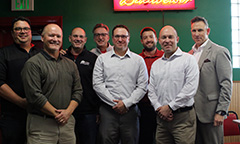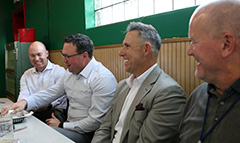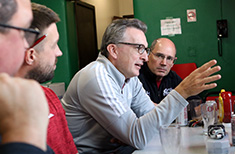Eight friends from Wabash meet for lunch on a Wednesday afternoon at the Working Man’s Friend, a well-known burger joint on Indianapolis’ west side.
The guys settle in with handshakes and smiles and the conversation quickly gathers momentum. Questions about how things went last weekend, jokes, and laughter begin to erupt. Someone cracks wise when one participant tries to order the “skinny plate” at the greasy spoon where the usual fare is a single, double, or triple burger.
Soon this group is in their own bubble, lost in this time together. So much so that no one notices the mayor of Indianapolis is seated at an adjacent table until the waitress points him out. After a brief pause, and friendly waves, the guys dive back into the conversation, fully engaged with each other for the 90 minutes or so they spend together.
The group on this day – Tim Craft ’00, Craig Demaree ’02, Jason Dyer ’85, Steve Hoffman ’85, Tim Maguire ’86, John Melind ’10, J.P. Patterson ’08, and Steve Woods ’93 – represented more than a dozen regular invitees who are Wabash men and football officials, calling games from the high school level to the National Football League on fall weekends.
 This crew first gathered as a function of networking, of meeting others with similar professional interests. Over time, it’s grown to help each one ask questions, talk through scenarios, decompress, and become better officials.
This crew first gathered as a function of networking, of meeting others with similar professional interests. Over time, it’s grown to help each one ask questions, talk through scenarios, decompress, and become better officials.
The rewarding byproduct is that they have become better friends along the way.
“It is great to be able to ask questions to those guys working at higher levels,” said Demaree, an NCAA Division II official. “It’s not just the lunches, but the ability to call at any time. We have definitely become friends and we look forward to seeing each other and celebrating each other’s successes.”
Craft, a high school official, agreed and pointed out another essential benefit.
“Having this brotherhood of Wabash officials is great for bouncing ideas and stories off more experienced officials,” he said. “Those guys are an inspiration to someone like me as I try to find a path to success in officiating.”
There is a lot of compassion in this group and an understanding of the feelings involved with making a bad spot, missing a call, or an incorrect interpretation. Chances are that someone at the table has been there before.
“With the humility of the veterans in our group, it’s never hard to muster the courage to bring up a mistake of yours because they have already told you about three of theirs in last week’s game,” explained Patterson, a high school and Division III official. “The biggest thing to get over in our group is your own ego, and once you know you can be imperfect, it’s easy to talk about a play you wish you had back and get feedback on how to not make the same mistake again. You just have to want to be a better official.”
 It’s that mentorship that matters because few who watch sports know the pressures of being an official.
It’s that mentorship that matters because few who watch sports know the pressures of being an official.
“It’s critical if you if you want to move up, no matter what level you are,” said Dyer. “A mentor helps you focus your effort on the things you’re doing well and what you need to work on. These are the people you should reach out to and this is how you get on a crew. In this group, I’ve learned that no one advances without lifting someone else up.”
Melind, who completed his second season of high school officiating last fall, appreciates the professional boost this group has given him as a newcomer.
“I feel way ahead of the game for a second-year official, in large part because of their willingness to include me,” he said. “These men have two of my lifetimes in combined experience, and it’s been a blessing that they have been proactive in including me, inviting me to meetings, and helping me along. J.P. and Tim have made concerted efforts to make me part of this pack.”
Each of these Wabash men cited two reasons for being an official: the ability to be a part of a team and to give back to the game they love.
Those factors are felt in different ways, whether it be working a game on a Friday, Saturday, or Sunday with a particular crew, or working to connect larger groups of officials, as Maguire did as a driving force behind creating the Indiana Football Officials Association.
 “What I love most about football is that I can still be on the field and participate in the sport with some of my best friends,” Demaree said.
“What I love most about football is that I can still be on the field and participate in the sport with some of my best friends,” Demaree said.
Being on the field as a part of an officiating crew is a rewarding experience, but it doesn’t come without effort. Certainly, there are parts of the Wabash experience that help, like critical thinking, crisis management skills, and the ability to think on your feet. There is a lot of preparation that goes into becoming a good official.
“Preparation makes it easier to officiate in real time,” said Melind. “Studying the mechanics, reviewing different game situations, and being prepared to act quickly is a big part of making it look like you know what you’re doing. Our job is to keep the game moving, and no one notices when the crew is doing that well.”
For Woods, who completed his sixth season as an NFL official in 2022, so much of the job is preparation. Between rules review, testing, and film work, he routinely puts in two hours of preparation each night for his weekly Sunday assignments.
He feels fortunate that his experience in the game, which started before the fourth grade, could extend well into his 60s. An official since 1999, Woods still enjoys the ritual of putting on his uniform every Sunday and walking through the tunnel onto the field.
“The amount of preparation I do as an official far outweighs the preparation I did as a player,” Woods said. “I love that I’m still involved, that I still get to do this. Even if I wasn’t in the NFL, I’d still be officiating. Because being part of a team still scratches that itch of competition I’ve always had.”
 Note: Craig Demaree ’02 will be a featured presenter on Friday, June 2, as part of “Wally in the Arena: A Symposium on College Sports and the Liberal Arts” during Big Bash reunion festivities. Demaree’s presentation, “Working Hard to Not be Noticed: The Role of Officials,” will take place at 2:15 p.m. in Hays Hall room 003.
Note: Craig Demaree ’02 will be a featured presenter on Friday, June 2, as part of “Wally in the Arena: A Symposium on College Sports and the Liberal Arts” during Big Bash reunion festivities. Demaree’s presentation, “Working Hard to Not be Noticed: The Role of Officials,” will take place at 2:15 p.m. in Hays Hall room 003.